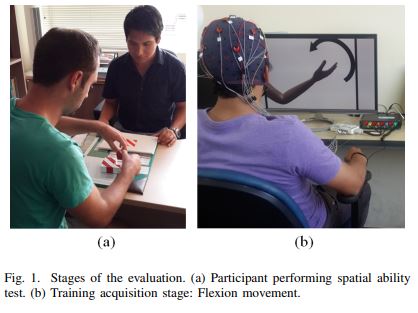Resumen: Motor Imagery based BCIs (MI-BCIs) allow the control of devices and communication by imagining different mental tasks. Despite many years of research, BCIs are still not the most accurate systems to control applications, due to two main factors: signal processing with classification, and users. It is admitted that BCI control involves certain characteristics and abilities in its users for optimal results. In this study, spatial abilities are evaluated in relation to MI-BCI control regarding flexion and extension mental tasks. Results show considerable correlation (r=0.49) between block design test (visual motor execution and spatial visualization) and extension-rest tasks. Additionally, rotation test (mental rotation task) presents significant correlation (r=0.56) to flexion-rest tasks.
Autor(es):Pacheco, K.; Acuña, K.; Carranza, E.; Achanccaray, D. y Andreu-Perez, J.
Año: 2017
Título de la revista: 2017 39th Annual International Conference of the IEEE Engineering in Medicine and Biology Society (EMBC)
Ciudad: Seogwipo, Corea del Sur
Página inicial - Página final: 1014-1017
Url: https://ieeexplore.ieee.org/document/8036998

